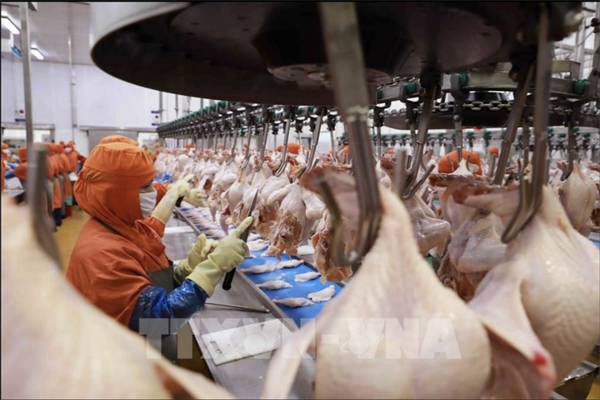These emissions primarily come from rice farming (50%), livestock (19%), land management, and fertilizer use (13%). Therefore, efforts to reduce emissions will necessarily involve both businesses and farmers.

As a company operating in the agro-food industry, CP Vietnam Corporation (C.P. Vietnam) prioritizes ecological and environmental protection in its production and business activities. The company has committed to reducing negative environmental impacts throughout its production and supply chain, aiming to become an emission-free enterprise by 2050.
Mr. Pawalit Ua Amornwanit, General Director of C.P. Vietnam, stated that the company strives to become a green enterprise by building a modern, smart, and environmentally friendly business model. The company is committed to sustainable development strategies, ensuring economic growth goals align with environmental and social benefits.
Accordingly, C.P. Vietnam effectively utilizes energy by increasing the use of renewable energy sources, including biomass energy, biogas, and solar energy. The company also adopts innovative technologies in production processes and principles of the circular economy to promote green and sustainable development. Currently, renewable energy accounts for 38% of the energy used by the company.
To optimize production and save resources, C.P. Vietnam selects equipment and machinery that consume less energy and have high production efficiency. Additionally, the company adopts new technologies by using automated and robotic systems in production, streamlining processes to reduce energy consumption in its factories (smart factories).
To balance emissions and restore ecosystems, C.P. Vietnam is undertaking the "C.P. Vietnam - Green Vietnam Journey 2021-2025" project, aiming to plant and care for 1.5 million trees in provinces affected by climate change, natural disasters, and floods.
Despite entering the agricultural investment field later than many leading companies, Xuan Thien Thanh Hoa Corporation (Xuan Thien Group) also emphasizes the importance of environmentally friendly technology and production processes. The group plans to invest about $1.5 billion in a production chain from farming to food processing, creating a closed-loop circular agricultural economy.
In livestock farming, the company uses odor-reducing air filtration technology and dietary regimes to minimize odors from waste. Waste is thoroughly treated through continuous scraping systems, with solid waste processed into organic fertilizer and wastewater treated and reused in farms.
"This method saves water and ensures the environment inside and outside the farm. Additionally, the livestock farm is located in a valley surrounded by natural hills, planted with many trees, and has a regulating lake to serve as a buffer zone, ensuring disease safety and environmental protection," said Mr. Nguyen Huy Hoang, General Director of Xuan Thien Thanh Hoa Corporation.
For agricultural products exported globally, linking them with emission reduction will become a consumption trend. With a strong export value exceeding $50 billion per year, Vietnamese agricultural products need to align with this trend to maintain their competitive advantage, as failing to do so may result in higher prices due to carbon taxes.
In line with the global green revolution and the Net Zero commitment on greenhouse gas emissions, many countries have established technical barriers for emission reduction and carbon taxes for sustainable green development, such as the EU's EUDR regulation effective from 2025.
As a leading coffee exporter, Phuc Sinh Corporation has been building a sustainable sector since 2012, before the EU regulations were established. The company continuously expands its production area annually, aiming to meet sustainable agriculture standards (Rainforest Alliance).
Mr. Nguyen Duy Tam, Director of Sustainable Development at Phuc Sinh Corporation, stated that by the end of 2024, the company will have the first areas meeting these standards, thereby complying with the EU's EUDR regulations.
"Phuc Sinh wants to demonstrate to the world that Vietnam has been pursuing sustainable production for a long time, not just reacting to import market regulations," said Mr. Nguyen Duy Tam.
He also shared that the company is collaborating with consulting units to measure carbon emissions throughout the production chain from farms to factories and distribution, identifying high-emission stages to implement reduction solutions.
For instance, at farms using sustainable production methods with organic fertilizers, emissions are lower. For households still using a lot of inorganic fertilizers, the company guides farmers step-by-step to reduce these fertilizers through model projects. To motivate farmers, the company buys sustainably produced products at higher prices than the market.
Deputy Minister of Agriculture and Rural Development Phung Duc Tien stated that green, organic agriculture is a global trend. In agricultural production, high-emission sectors include crop cultivation, livestock farming, and aquaculture. All three sectors must implement decisive, comprehensive solutions to reduce emissions.
The Prime Minister has approved and will continue to approve environmental protection projects in various agricultural sectors. Comprehensive solutions in these areas will enable Vietnam to achieve net-zero emissions by 2050. Vietnam's agriculture has significant development potential through digital transformation, circular economy, traceability, and emission reduction.
Source: Bích Hồng/BNEWS/TTXVN (Original article link: Nông nghiệp chuyển đổi không phát thải (bnews.vn))